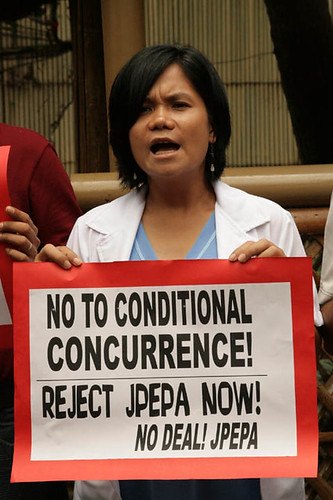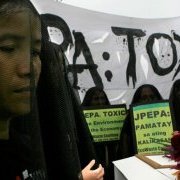- Negotiations

The governments of Japan and the Philippines reached a basic political agreement on the Japan-Philippines Economic Partnership Agreement (JPEPA) on 29 November 2004 at the ASEAN Summit in Laos. The agreement was then signed in Helsinki on 9 September 2006 and came into force on 11 December 2008. It was the Philippines’ first free trade agreement and Japan’s fourth.
JPEPA was and remains hugely controversial. Filipinos — and on some issues, Japanese groups — mobilised to stop the deal for many reasons, including the following:
– the small job market openings for Filipino healthcare workers are very limited (the workers must learn Japanese, undergo equivalency exams, stay for only a restricted time etc) and overlook the real potential for abuse of Filipino workers in Japan;
– concerns that Japan will gain access to and be able to overfish Philippine waters, ruining the livelihoods of small fisherfolk;
– any supposed benefits for increased pineapple and banana exports to Japan would in fact go to corporations like Dole and Del Monte, and their local business partners, who own and run the plantations in the Philippines — not to small or landless Filipino farmers;
– its unconstitutionality, since JPEPA allows Japanese corporations to own land, operate schools and practice certain professions in the Philippines which the Philippine Constitution does not allow;
– the huge imbalances in the deal, e.g. Japan excluded almost 200 tariff lines from the agreement, the Philippines only six; and
– the fact that JPEPA gives explicit legal ground for Japan to dump toxic wastes in the Philippines.
last update: May 2012
Photo: Karasantos / CC BY-NC-SA 2.0
5-May-2009
The first batch of nurses and caregivers who have been hired under the Japan-Philippines Economic Partnership Agreement (JPEPA) are ready to be deployed to Japan this weekend, the Philippine Overseas Employment Administration (POEA) said Tuesday.
4-Apr-2009
Philippine food exporters were able to sell millions of dollars worth of their products after participating in a business mission and a trade fair in Japan, the country’s third-largest export market.
15-Feb-2009
The Japan-Philippines Economic Partnership Agreement (Jpepa) would be put to a test under the current global financial turmoil and recession.
18-Jan-2009
Business Mirror
The Philippine Bureau of Customs (BOC), the government’s second-largest revenue earner, said the implementation of Japan-Philippines Economic Partnership Agreement (Jpepa) will hurt its collection for the year as it stands to lose billions of pesos.
9-Jan-2009
BW
In the first part of this article, the issues that hounded the ratification of the Japan-Philippines Economic Partnership Agreement (JPEPA) will be discussed, as well as the Senate Resolution that led to ratification.
6-Jan-2009
GMA News
A national federation of small fisherfolk organizations in the Philippines filed a diplomatic protest Tuesday at the Japanese Embassy against poaching by Japanese tuna factory ships in waters off Aurora province.
31-Dec-2008
GMANews
The fisherfolk alliance Pambansang Lakas ng Kilusang Mamamalakaya ng Pilipinas (Pamalakaya) on Saturday decried the "gang rape" of the country’s tuna stocks by Japanese, South Korean, and Taiwanese companies poaching in the portions of Philippine Sea in Aurora province.
24-Dec-2008
INQ
The Filipino fisherfolk group Pamalakaya is urging the Department of Foreign Affairs to investigate the reported entry of foreign fishing vessels allegedly feasting on rich tuna grounds in portions of the Philippine Sea. The fishing vessels are reportedly owned by Japanese, Korean and Taiwanese companies, and Japan has recently access to Philippine waters under JPEPA.
22-Dec-2008
GMA News
A final protocol for the Japan-Philippines Economic Partnership Agreement (JPEPA) allowing small farmers to sell bananas to Japan has been submitted and is up for comment, said a Bureau of Plant Industry official.
10-Dec-2008
The controversial Japan-Philippines Economic Partnership Agreement (JPEPA) takes effect Thursday, December 11, with simple ceremonies in Tokyo, Philippine labor attaché to Japan Danilo Cruz said Wednesday.






